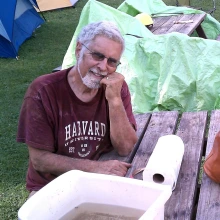Introducing UIR Scholar in Residence, Scholar Emeritus Spouse
We are pleased to introduce the new University Indian Ruin Scholar, Lisa Young, and her husband, John Speth, who was UIR Scholar in the summers of 2016 and 2019. Two publications John worked on while at UIR are listed here.

I’m Lisa Young, the UIR Scholar in residence for the Spring and Summer Semesters. I am so excited to be back at the University of Arizona, the place where I began thinking about collaborations between archaeologists and Indigenous communities as a graduate student working on the Homol’ovi Research Project. Recently, I’ve become increasingly interested in the role of food in building collaborative relationships. On April 19, I give a talk for the Arizona Archaeological and Historical Society reflecting on the role of food in nourishing (pun intended) partnerships at the Homolovi State Park with members of the Hopi community (LINK).
My research this semester explores the ways that object life histories and digital technology can help reconnect museum collections with communities of origin. The case studies for this project are two 1930s ethnographic projects undertaken by Volney Jones, an ethnobotanist at the University of Michigan. Jones conducted extensive interviews with Anishinaabe basket makers in Ontario and Hopi farmers in northeastern Arizona, in addition to acquiring museum collections. This research and a related website that I am creating engages with broader issues of Indigenous plant knowledge, seed sovereignty, and the role of museum collections.
I will be in Tucson until July and am excited to meet (with appropriate COVID protocols) with students, faculty, researchers, or really anyone who interested in exploring ways to build collaborative community-based projects through archaeology, museum collections, food, or plants (email: lcyoung@umich.edu). When not glued to my computer, I’ve begun exploring Tucson’s rich gastronomic heritage because I’m passionate about local food and the people who produce it.

I’m John Speth, an archaeologist from the University of Michigan, but here in Tucson at the UIR until this coming July as the “trailing spouse” with Lisa Young, this semester’s UIR Scholar in Residence. While here, I’d be delighted to meet with folks from Anthropology—via ZOOM or in person (of course, observing Covid protocols as needed)—including faculty and students, graduate and undergraduate, informally or “ZOOM-ing” into classes. I have a range of different interests. Among them are: hunters and gatherers, both past and present; zooarchaeology (I work a lot with Middle Paleolithic faunas in the Near East, and also with prehistoric bison hunters in North America). I have also written on the origins of Plains-Pueblo interaction in the Southwest and Southern Plains. In addition, I am interested in the evolution of human foodways, and have published recently on topics such as the origins of boiling in the Paleolithic; the role of putrid meat and fish as a safe and effective alternative to cooking, as a low-tech means of food storage, and as a way of assuring sufficient vitamin C intake; the necessity of surplus killing by heavily meat-dependent northern hunters as a means of assuring adequate fat intakes; interpretive problems in the use of zooarchaeological utility indices; and problems in current understandings of hunter-gatherer mobility. Bottom line: I love almost anything that, at first glance, seems counterintuitive...
You can reach me at jdspeth@umich.edu.
Anthro News Digest date: 03/26/2021

